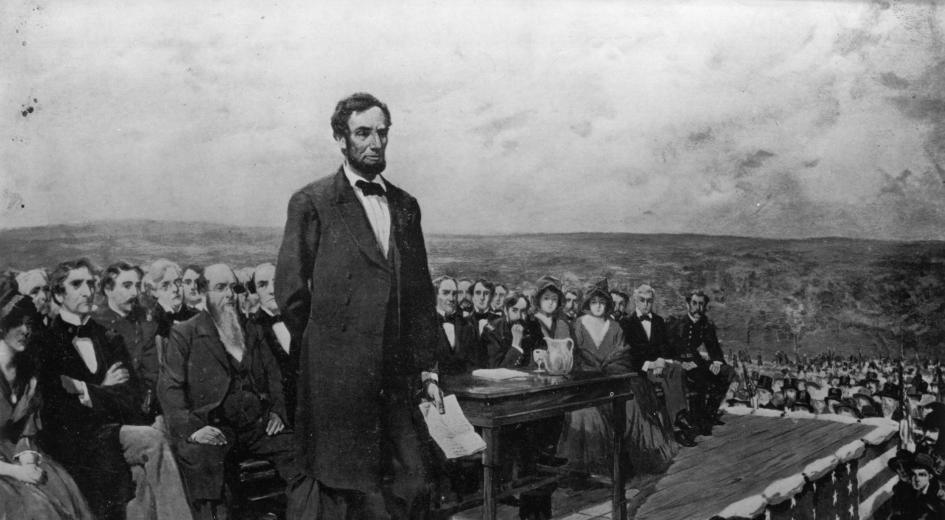Tara Ross – November 19, 2021
On this day in 1863, Abraham Lincoln delivers his famous Gettysburg address. Did you know that no one knows exactly where he gave the speech? And no one knows precisely what he said? Several different transcripts of the speech exist, each with slightly different phrasing.
His speech wasn’t even supposed to be the main feature that day! Instead, a two-hour oration by a former Secretary of State, Edward Everett, was supposed to be the highlight.
Lincoln’s two-minute speech would go down in history. Everett’s has been mostly forgotten.
Perhaps Everett saw the writing on the wall? He wrote to the President the very next day, apparently already realizing the impact of Lincoln’s words. “Permit me also to express my great admiration of the thoughts expressed by you,” Everett wrote, “with such eloquent simplicity & appropriateness, at the consecration of the Cemetery. I should be glad, if I could flatter myself that I came as near to the central idea of the occasion, in two hours, as you did in two minutes.”
Both men had been slated to speak at a dedication ceremony for Soldiers’ National Cemetery in Gettysburg, Pennsylvania. Union forces had won a battle there mere months earlier, but that battle had been a brutal, 3-day affair. Fifty-one thousand soldiers had been left dead or wounded.
It was a costly victory, to say the least.
Lincoln had prepared remarks, written on a slip of paper. Legend has it that he threw the address together as he rode on a train toward Gettysburg, but he actually spent a bit more time on it than that. By the time he got to the ceremony, he had prepared remarks that he had carefully considered, and he reportedly used them. But here’s the interesting part: Modern scholars aren’t sure which of the five known, still-existing transcripts Lincoln used that day—or potentially he could even have used an unknown, sixth transcript!
So what are these five known, still-existing transcripts?
Two are copies that Lincoln gave to his personal secretaries. Three others were written by Lincoln for charitable purposes, but he wrote them well after his November 19 address.
The version that is most often cited is the transcript that was requested by historian George Bancroft; he intended to use if at a fundraiser for soldiers. The request was fulfilled, but the final transcript was ultimately delivered to Bancroft’s stepson, Colonel Alexander Bliss. The so-called “Bliss copy” is the last known transcript written in Lincoln’s hand. It is also the only transcript that has his signature.
In this final text, Lincoln had removed one instance of the word “here,” which is in all other copies of the speech. Historian Garry Wills finds this last omission important: “[Lincoln] was still making such improvements,” He notes. It “suggests that he was more concerned with a perfected text than with an ‘original’ one.”
The Bliss text is the version that is emblazoned on the Lincoln Monument. It famously concludes:
“[W]e here highly resolve that these dead shall not have died in vain—that this nation, under God, shall have a new birth of freedom, and that government of the people, by the people, for the people, shall not perish from the earth.”
Enjoyed this post? More stories about U.S.
Presidents can be found on my website, HERE.
Primary Sources:
- Biographies of the Secretaries of State: Edward Everett (1794–1865) (Department of State; Office of the Historian)
- Garry Wills, Lincoln at Gettysburg: The Words that Remade America (2006)
- Getty sburg Address (Library of Congress)
- Letter from Abraham Lincoln to Edward Everett (Nov. 20, 1863)
- Richard Brookhiser, Founders’ Son: A Life of Abraham Lincoln (2014)
- The Other Gettysburg Address (N.Y. Times; Nov. 19, 2013)
***
The Gettysburg Address
Four score and seven years ago our fathers brought forth on this continent, a new nation, conceived in Liberty, and dedicated to the proposition that all men are created equal.
Now we are engaged in a great civil war, testing whether that nation, or any nation so conceived and so dedicated, can long endure. We are met on a great battle-field of that war. We have come to dedicate a portion of that field, as a final resting place for those who here gave their lives that that nation might live. It is altogether fitting and proper that we should do this.
But, in a larger sense, we can not dedicate — we can not consecrate — we can not hallow — this ground. The brave men, living and dead, who struggled here, have consecrated it, far above our poor power to add or detract. The world will little note, nor long remember what we say here, but it can never forget what they did here. It is for us the living, rather, to be dedicated here to the unfinished work which they who fought here have thus far so nobly advanced. It is rather for us to be here dedicated to the great task remaining before us — that from these honored dead we take increased devotion to that cause for which they gave the last full measure of devotion — that we here highly resolve that these dead shall not have died in vain — that this nation, under God, shall have a new birth of freedom — and that government of the people, by the people, for the people, shall not perish from the earth.
Abraham Lincoln, November 19, 1863

